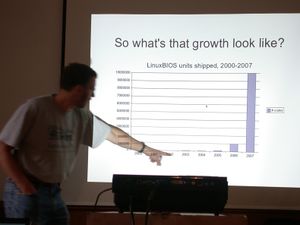Welcome to coreboot: Difference between revisions
Jump to navigation
Jump to search
m (Don't scare people with clusters right away ;)) |
mNo edit summary |
||
| Line 57: | Line 57: | ||
[[Image:chip_devel.png]] | [[Image:chip_devel.png]] | ||
|style="vertical-align:top"| | |style="vertical-align:top"| | ||
'''Developers'''<br /><small>Get involved! Help us make LinuxBIOS better!</small><hr />[[Development Guidelines]] | [https://openbios.org/roundup/linuxbios/ Issue Tracker] | [ | '''Developers'''<br /><small>Get involved! Help us make LinuxBIOS better!</small><hr />[[Development Guidelines]] | [https://openbios.org/roundup/linuxbios/ Issue Tracker] | [[LinuxBIOS Options]] | [[JTAG/BSDL Guide|JTAG]] | [[EHCI Debug Port]] | ||
|} | |} | ||
Revision as of 15:12, 18 October 2006
|
LinuxBIOS is a Free Software project aimed at replacing the proprietary BIOS you can find in most of today's computers. It performs just a little bit of hardware initialization and then executes one of many possible payloads, e.g. a Linux kernel, FILO, OpenBIOS, Etherboot, ADLO (for booting Windows 2000 and OpenBSD), Plan 9, memtest86 and many more.
Quick Links
|

News
|





